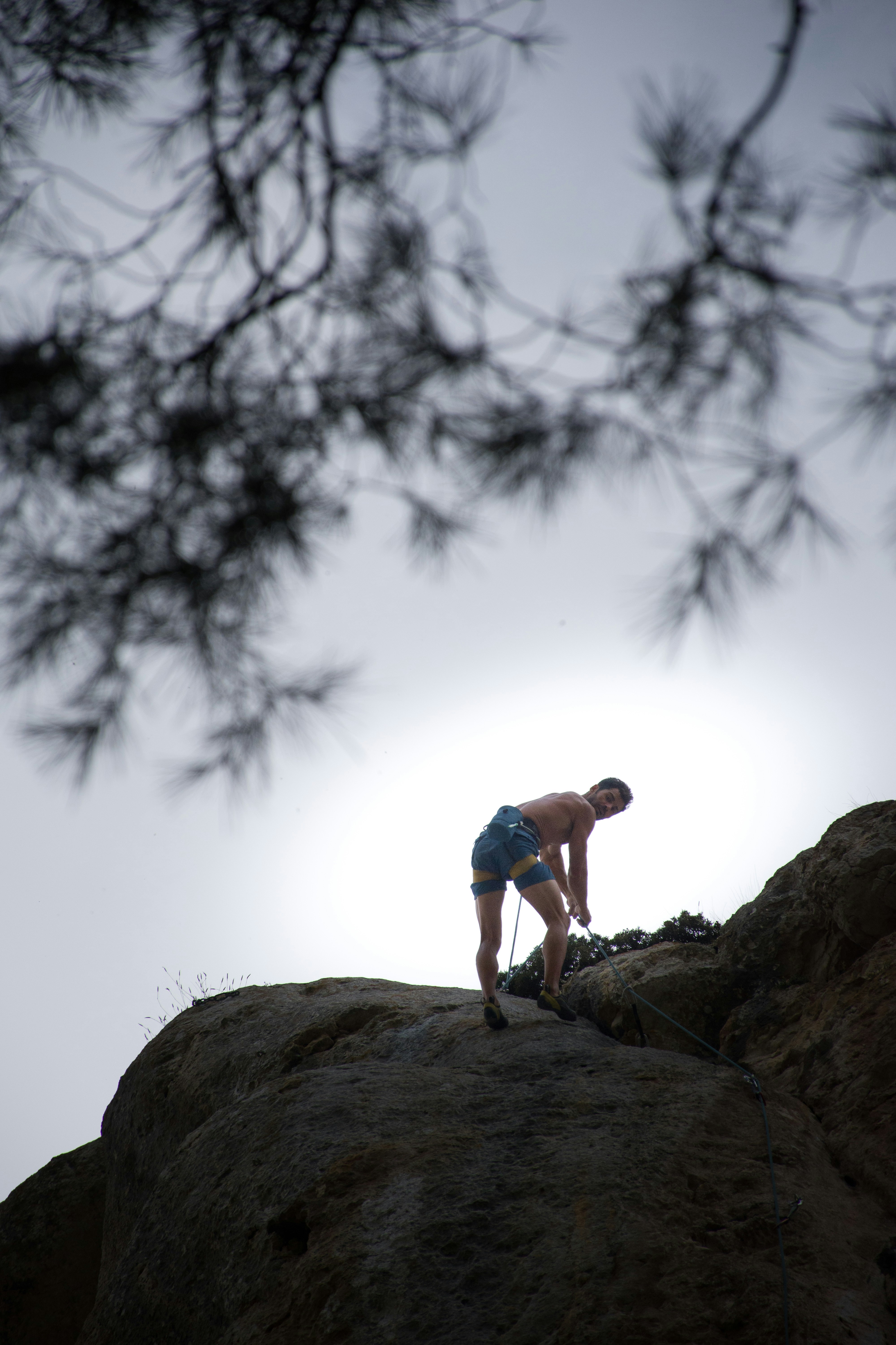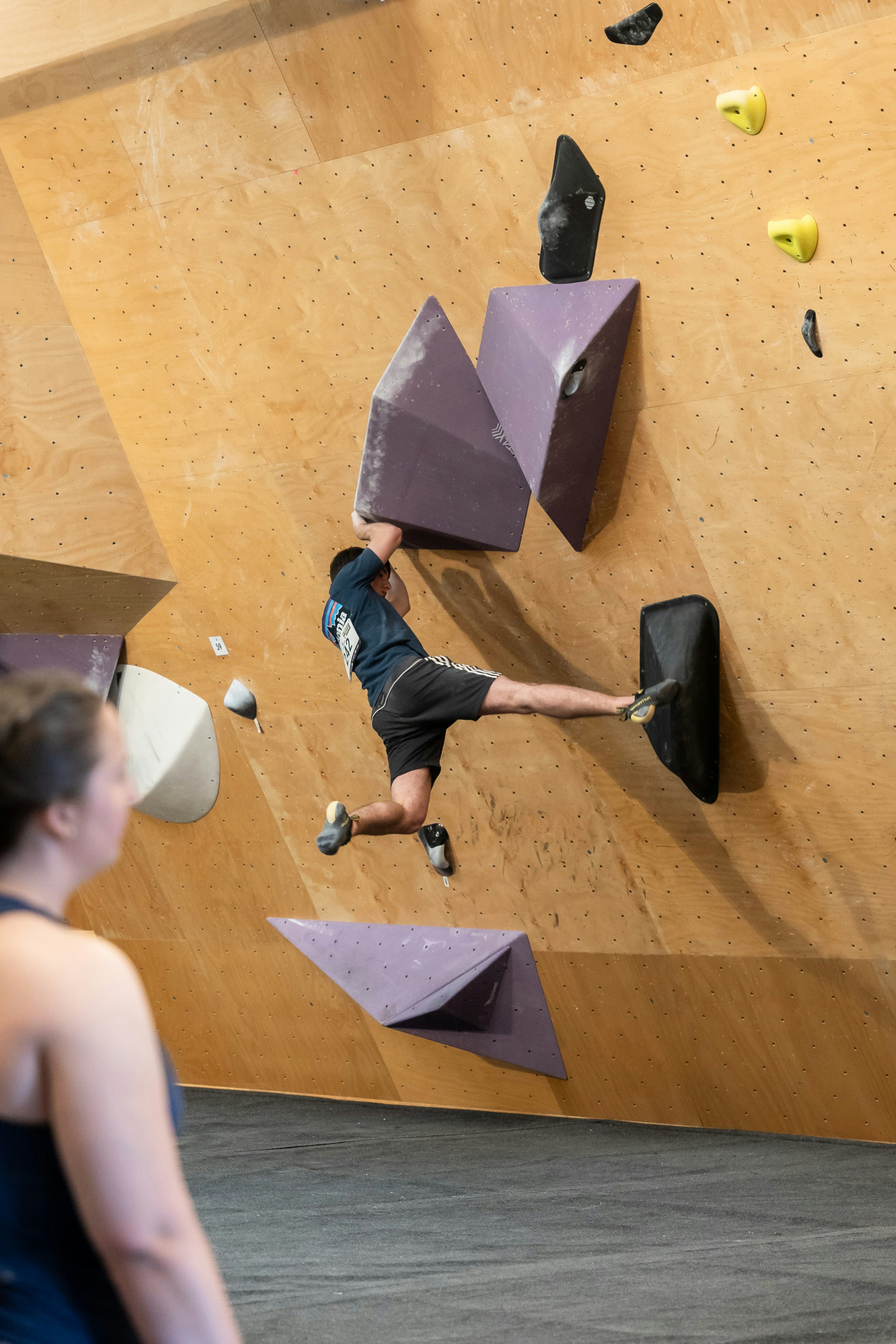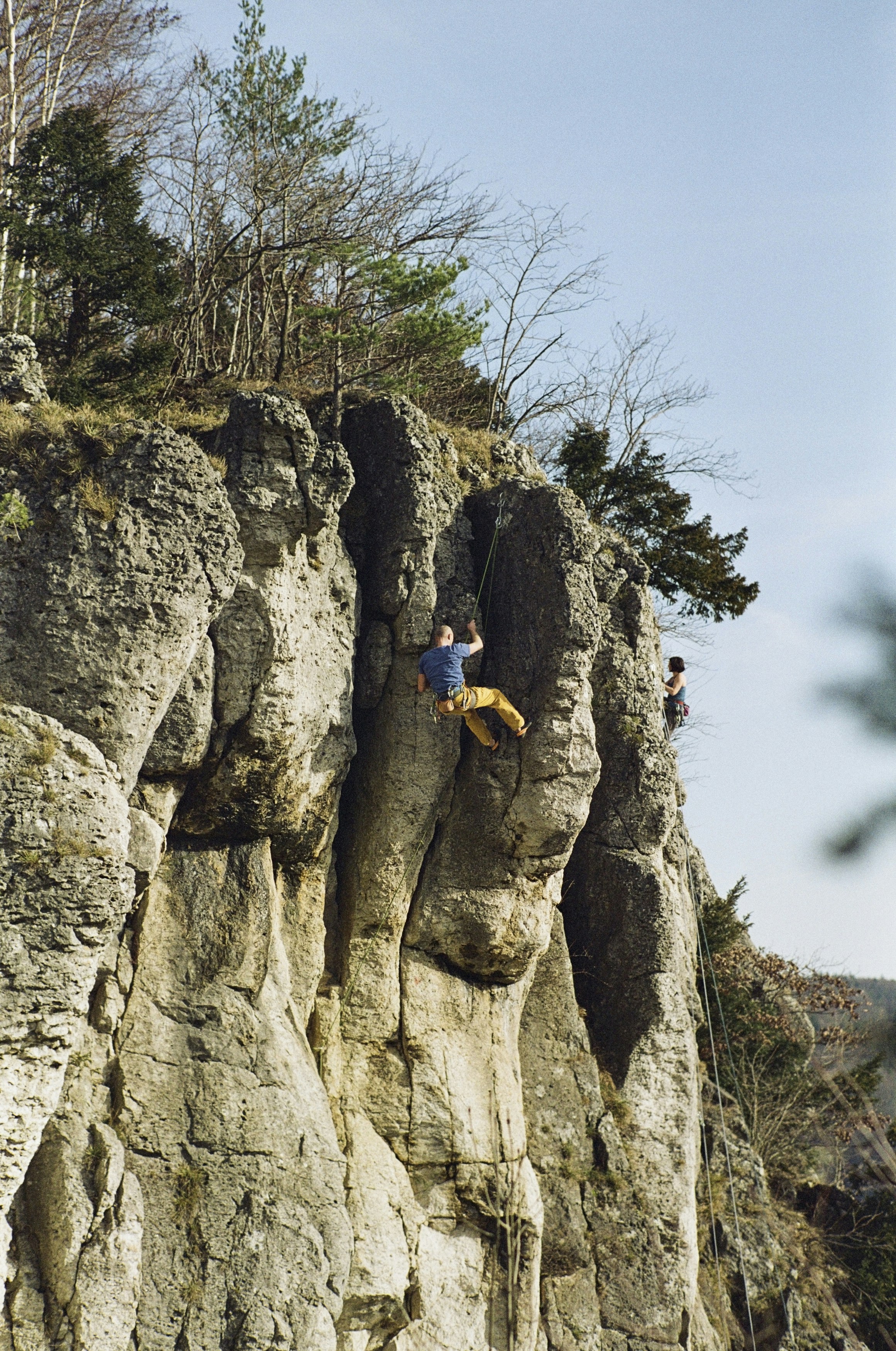You've probably watched the highlights from the 2025 World Championships in Seoul this week and wondered how athletes like Janja Garnbret and Toby Roberts maintain their composure when millions are watching and everything is on the line. The difference between good competitive climbers and champions isn't just physical preparation - it's the mental game that unfolds in those crucial moments between studying the problem and stepping onto the wall.
Competition climbing at the world level reveals mental tactics that apply whether you're competing at your local gym or gunning for nationals. The pressure might be different in scale, but the fundamental challenges remain the same: managing nerves, making smart tactical decisions, and executing when it matters most. What we've seen in Seoul offers a masterclass in competitive mental strategy.
The most fascinating aspect of watching world-level competition isn't the incredible physical feats - though they're impressive - it's observing how elite athletes manage their mental state throughout the competition process. From the moment they enter the isolation zone to their final move on the wall, every decision reflects years of mental training and tactical preparation.
The Isolation Zone Mental Game
The isolation zone might seem like dead time, but it's where competitions are often won or lost. Elite climbers use this time strategically, not just to stay loose physically but to prepare mentally for what's ahead. The athletes who thrive understand that isolation is their opportunity to control their mental state before the variables of competition take over.
Watch how different athletes handle isolation and you'll notice distinct patterns. Some prefer social interaction, feeding off energy from teammates and maintaining loose, conversational attitudes. Others go completely internal, using visualization techniques and mental rehearsal to prepare for the challenges ahead. Neither approach is universally correct - success comes from knowing what works for your personality and competitive style.
The key insight from elite competition is that isolation time has structure and purpose. Athletes aren't just killing time; they're following established routines that put them in optimal mental states. This might include specific warm-up sequences, breathing exercises, visualization protocols, or even music playlists that consistently produce the right emotional state for competition.
Effective isolation routines address both energy management and focus preparation. You need enough energy to climb powerfully but not so much nervous energy that it interferes with precise movement. You need focused attention but not tunnel vision that prevents adaptive problem-solving. Elite athletes have spent years calibrating their isolation routines to hit this sweet spot consistently.
The social dynamics of isolation zones also play crucial tactical roles. Experienced competitors know when to engage with others and when to maintain focus on their own preparation. They read the room, understand how their own energy affects teammates, and make strategic choices about interaction based on what serves their performance best.
Route Reading Under Championship Pressure
Championship-level route reading operates under completely different constraints than casual climbing analysis. You have limited time, can't test moves physically, and must make decisions that could determine medal outcomes. The athletes who excel have developed systematic approaches that maximize the value of their preview time while managing the pressure of making crucial decisions quickly.
Elite route reading isn't just about identifying holds and sequences - it's about strategic analysis that considers your strengths, weaknesses, and competitive situation. If you're leading after boulder one, your approach to problem two might be more conservative. If you need to make up ground, you might identify higher-risk sequences that could provide competitive advantages if executed successfully.
The most sophisticated competitors use preview time to develop multiple tactical approaches to challenging sections. They identify their primary sequence, but also prepare backup options for situations where their first choice doesn't work as planned. This strategic flexibility proves invaluable when problems don't feel exactly as they looked from the ground.
Mental preparation during route reading involves more than just visualization - it's about emotional preparation for various scenarios. Elite athletes anticipate how they'll feel if they struggle with certain moves, prepare mentally for the possibility of failing at specific points, and develop emotional strategies for maintaining composure regardless of how the climb unfolds.
The pressure of championship route reading also requires managing perfectionist tendencies that can paralyze decision-making. Elite competitors have learned to gather the information they need efficiently, make their tactical decisions with confidence, and resist the urge to overthink details that won't significantly impact their performance.
Managing Competition Nerves and Activation
Championship nerves aren't something to eliminate - they're energy to harness and direct productively. The athletes performing at the highest levels have learned to interpret nervous energy as excitement and preparation rather than anxiety and threat. This reframing changes everything about how competition pressure affects performance.
The concept of optimal activation level is crucial for competition success. You need enough physiological arousal to climb powerfully and react quickly, but not so much that fine motor control suffers or decision-making becomes impaired. Elite athletes have developed personal awareness of their optimal activation zones and techniques for reaching those states consistently.
Breathing techniques serve multiple functions in competition climbing beyond simple relaxation. Controlled breathing helps regulate activation levels, provides a focal point when thoughts become scattered, and creates rhythm that can be maintained throughout challenging sequences. The specific breathing patterns that work vary by individual, but the principle of using breath as an anchor for mental state management applies universally.
Pre-performance routines become especially important under championship pressure. These routines serve as mental bridges between preparation and execution, providing familiar structure when everything else feels uncertain. Effective routines are specific enough to create consistency but flexible enough to adapt to varying competition circumstances.
The psychological challenge of competition climbing often involves managing perfectionist expectations. Elite performers have learned to set process goals rather than outcome goals, focusing on executing their preparation and tactics rather than obsessing over results they can't directly control. This mental approach reduces performance anxiety while maintaining high standards for preparation and execution.
Tactical Decision-Making During Competition
Championship climbing requires constant tactical decision-making under pressure. Do you attempt the risky dynamic move or look for a more controlled alternative? Do you rest here or push through to the next potential rest position? These split-second decisions often determine competition outcomes, and elite athletes have developed frameworks for making them effectively.
Risk assessment becomes crucial when every move matters for competitive results. Elite climbers evaluate risks not just in terms of success probability, but in terms of energy cost, recovery implications, and strategic position for subsequent problems or rounds. This multi-dimensional risk analysis happens quickly but systematically during actual climbing.
The concept of climbing within yourself versus pushing boundaries creates interesting tactical dilemmas in competition. Sometimes conservative climbing that ensures completion serves competitive goals better than attempting spectacular moves that might fail. Elite competitors have developed intuitive sense for when to push limits and when to climb smart and controlled.
Energy management throughout competition requires strategic thinking that extends beyond individual problems. Elite athletes consider how their approach to early problems affects their capacity for later rounds, how much energy to invest in uncertain outcomes, and how to maintain quality execution even when fatigue accumulates.
Adaptive problem-solving during competition involves staying mentally flexible when original plans don't work. Elite climbers maintain calm when sequences feel different than expected, quickly generate alternative solutions, and execute revised plans without losing confidence or composure. This adaptability comes from extensive problem-solving practice under various conditions.
Learning from Failure and Building Resilience
Championship competition inevitably involves failures, setbacks, and disappointing performances. What separates elite competitors is how quickly they process these experiences, extract useful information, and refocus on upcoming opportunities. This resilience isn't natural talent - it's a developed skill that improves with deliberate practice.
The immediate aftermath of competition failures reveals telling differences between athletes. Some spiral into negative self-talk and emotional reactivity that affects subsequent performance. Others quickly acknowledge what happened, identify controllable factors for next time, and redirect their mental energy toward preparation for upcoming attempts.
Elite athletes have developed systematic approaches for learning from competition experiences without getting trapped in analysis paralysis. They schedule specific times for reviewing performances, focus on process factors they can control, and separate technical analysis from emotional processing. This structured approach maximizes learning while minimizing negative emotional impacts.
Building competitive resilience involves exposure to pressure situations throughout training, not just during competitions. Elite athletes create pressure scenarios during practice sessions, compete in lower-stakes events regularly, and deliberately put themselves in challenging situations that build comfort with discomfort.
The long-term perspective that elite competitors maintain helps them contextualize individual competition results appropriately. They understand that competitive climbing careers involve many ups and downs, that single events rarely define overall success, and that consistent preparation matters more than perfect execution in any individual competition.
Preparation Strategies That Transfer to Any Level
The mental preparation strategies that work at world championship levels scale down effectively for climbers competing at any level. The principles remain the same even when the stakes are different: systematic mental preparation, tactical decision-making frameworks, and resilience building through deliberate practice.
Developing your own pre-competition routines starts with honest self-assessment of what mental states produce your best climbing performance. Some climbers need high energy and excitement; others perform better calm and focused. Experiment with different preparation approaches during training to identify what works consistently for your competitive personality.
Visualization practice becomes more effective when it includes multiple sensory modalities and potential scenarios. Don't just see yourself succeeding - feel the holds in your hands, hear the sounds of the competition environment, and prepare mentally for various outcomes including failures and setbacks. This comprehensive mental rehearsal builds familiarity with competition experiences before they happen.
Pressure training should be integrated regularly into your climbing practice, not saved for competition seasons. Create artificial pressure through time constraints, audience simulation, consequences for failure, or other stressors that elevate your activation level while practicing mental management techniques.
Competition journaling helps identify patterns in your competitive performance and mental state management. Track not just your climbing results but your mental preparation, tactical decisions, and emotional experiences throughout competitions. This data becomes invaluable for refining your competitive approach over time.
Building Competition Confidence Through Process Focus
Confidence in competition climbing comes from trusting your preparation rather than predicting outcomes. Elite athletes focus heavily on process elements they can control - their training quality, mental preparation, tactical planning, and execution focus - rather than obsessing over results that depend on many variables beyond their direct control.
The concept of earned confidence resonates throughout championship-level climbing. Athletes who have put in thorough preparation work feel fundamentally different approaching competitions than those who hope their natural ability will carry them through. This preparation-based confidence remains stable even when individual climbs don't go as planned.
Technical confidence builds through extensive practice of competition-specific skills under pressure-like conditions. Elite athletes don't just climb; they practice route reading under time pressure, work on problems with competition-style hold sets, and rehearse their tactical decision-making processes repeatedly until they become automatic.
Mental confidence develops through successful management of pressure situations over time. Each competition provides opportunities to test and refine your mental game, build familiarity with competitive environments, and prove to yourself that you can perform when it matters. This confidence compounds over multiple competitive experiences.
The relationship between preparation and confidence creates a positive feedback loop for serious competitive climbers. Better preparation leads to improved competitive performance, which builds confidence for future competitions, which motivates more thorough preparation. Elite athletes leverage this cycle systematically throughout their competitive careers.
Advanced Mental Training Applications
Elite competitive climbers often work with sports psychologists to develop sophisticated mental training programs tailored to their specific needs and competitive challenges. These programs go well beyond basic relaxation techniques to include detailed analysis of individual performance patterns and customized intervention strategies.
Attention control training helps athletes manage their focus during the complex, multi-stage process of competition climbing. This might include techniques for maintaining concentration during long isolation periods, strategies for optimal attention during route reading, and methods for staying present during actual climbing execution.
Emotional regulation skills become crucial for managing the intense emotional experiences of championship competition. Elite athletes learn to recognize their emotional states quickly, understand how different emotions affect their climbing performance, and employ specific techniques for shifting into optimal emotional states when needed.
Performance analysis from a mental perspective involves reviewing competitions not just for technical execution but for mental game effectiveness. Elite athletes analyze their route reading decisions, activation level management, tactical choices, and resilience responses to identify areas for mental game improvement.
The integration of mental training with physical preparation ensures that psychological preparation supports rather than competes with technical and fitness development. Elite programs coordinate mental training timing with physical training cycles, ensuring that mental preparation peaks align with competitive requirements.
Practical Implementation for Developing Competitors
Implementing elite-level mental strategies doesn't require world-class coaching or resources - it requires systematic attention to the mental aspects of competitive climbing development. Start with honest assessment of your current mental game strengths and weaknesses, then develop targeted improvement plans that address your specific needs.
Regular competition exposure becomes crucial for mental game development, even if these competitions are local gym events or informal competitions with training partners. The key is creating opportunities to practice mental skills under pressure and receive feedback on your competitive performance patterns.
Consistency in mental preparation matters more than sophistication of techniques. Simple routines practiced consistently prove more effective than complex strategies applied inconsistently. Focus on developing reliable mental preparation habits that you can execute regardless of competition conditions or external circumstances.
The long-term development perspective reminds us that competitive mental skills develop over years rather than weeks. Be patient with your mental game development while maintaining consistent attention to psychological preparation alongside technical and physical training.
What we've witnessed at the World Championships in Seoul this week demonstrates that mental preparation isn't just about managing nerves - it's about systematic preparation that enables peak performance when everything is on the line. These strategies work whether you're competing for world titles or personal bests, because the fundamental challenge remains the same: executing your best climbing when it matters most.
The mental game separates good climbers from great competitors, and great competitors from champions. The techniques are learnable, the skills are developable, and the benefits extend far beyond competition climbing into every aspect of your climbing development. Start building your mental game systematically, and watch how it transforms not just your competitive performance, but your relationship with challenging climbing in all its forms.


